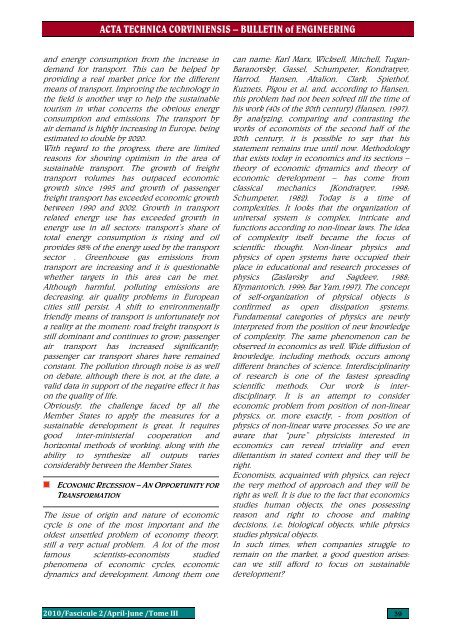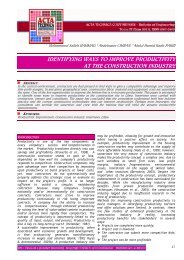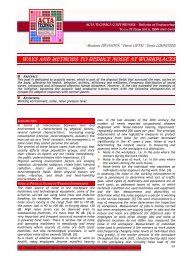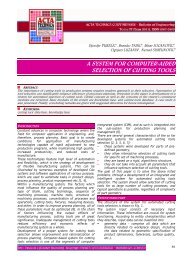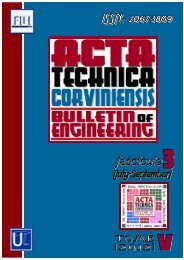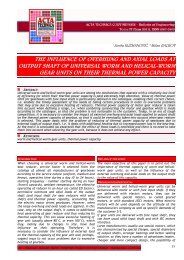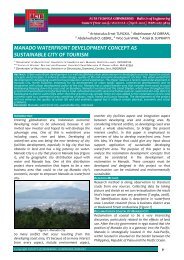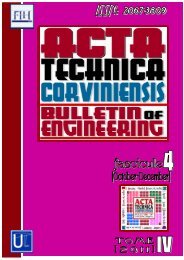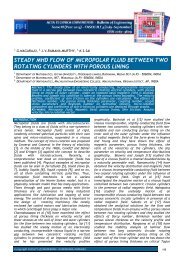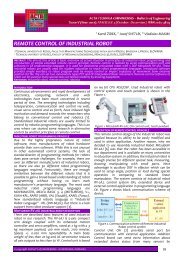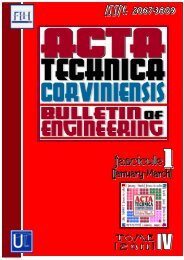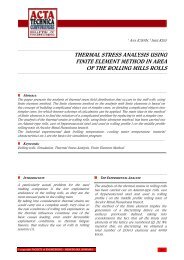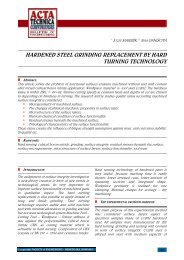ACTA TECHNICA CORVINIENSIS - Bulletin of Engineering
ACTA TECHNICA CORVINIENSIS - Bulletin of Engineering
ACTA TECHNICA CORVINIENSIS - Bulletin of Engineering
- No tags were found...
You also want an ePaper? Increase the reach of your titles
YUMPU automatically turns print PDFs into web optimized ePapers that Google loves.
<strong>ACTA</strong> <strong>TECHNICA</strong> <strong>CORVINIENSIS</strong> – BULLETIN <strong>of</strong> ENGINEERINGand energy consumption from the increase indemand for transport. This can be helped byproviding a real market price for the differentmeans <strong>of</strong> transport. Improving the technology inthe field is another way to help the sustainabletourism in what concerns the obvious energyconsumption and emissions. The transport byair demand is highly increasing in Europe, beingestimated to double by 2020.With regard to the progress, there are limitedreasons for showing optimism in the area <strong>of</strong>sustainable transport. The growth <strong>of</strong> freighttransport volumes has outpaced economicgrowth since 1995 and growth <strong>of</strong> passengerfreight transport has exceeded economic growthbetween 1990 and 2002. Growth in transportrelated energy use has exceeded growth inenergy use in all sectors: transport’s share <strong>of</strong>total energy consumption is rising and oilprovides 98% <strong>of</strong> the energy used by the transportsector . Greenhouse gas emissions fromtransport are increasing and it is questionablewhether targets in this area can be met.Although harmful, polluting emissions aredecreasing, air quality problems in Europeancities still persist. A shift to environmentallyfriendly means <strong>of</strong> transport is unfortunately nota reality at the moment: road freight transport isstill dominant and continues to grow; passengerair transport has increased significantly;passenger car transport shares have remainedconstant. The pollution through noise is as wellon debate, although there is not, at the date, avalid data in support <strong>of</strong> the negative effect it hason the quality <strong>of</strong> life.Obviously, the challenge faced by all theMember States to apply the measures for asustainable development is great. It requiresgood inter-ministerial cooperation andhorizontal methods <strong>of</strong> working, along with theability to synthesize all outputs variesconsiderably between the Member States.ECONOMIC RECESSION – AN OPPORTUNITY FORTRANSFORMATIONThe issue <strong>of</strong> origin and nature <strong>of</strong> economiccycle is one <strong>of</strong> the most important and theoldest unsettled problem <strong>of</strong> economy theory,still a very actual problem. A lot <strong>of</strong> the mostfamous scientists-economists studiedphenomena <strong>of</strong> economic cycles, economicdynamics and development. Among them onecan name: Karl Marx, Wicksell, Mitchell, Tugan-Baranovsky, Gassel, Schumpeter, Kondratyev,Harrod, Hansen, Aftalion, Clark, Spieth<strong>of</strong>,Kuznets, Pigou et al. and, according to Hansen,this problem had not been solved till the time <strong>of</strong>his work (40s <strong>of</strong> the 20th century) (Hansen, 1997).By analyzing, comparing and contrasting theworks <strong>of</strong> economists <strong>of</strong> the second half <strong>of</strong> the20th century, it is possible to say that hisstatement remains true until now. Methodologythat exists today in economics and its sections –theory <strong>of</strong> economic dynamics and theory <strong>of</strong>economic development – has come fromclassical mechanics [Kondratyev, 1998;Schumpeter, 1982). Today is a time <strong>of</strong>complexities. It looks that the organization <strong>of</strong>universal system is complex, intricate andfunctions according to non-linear laws. The idea<strong>of</strong> complexity itself became the focus <strong>of</strong>scientific thought. Non-linear physics andphysics <strong>of</strong> open systems have occupied theirplace in educational and research processes <strong>of</strong>physics (Zaslavsky and Sagdeev, 1988;Klymantovich, 1999; Bar Yam,1997). The concept<strong>of</strong> self-organization <strong>of</strong> physical objects isconfirmed as open dissipation systems.Fundamental categories <strong>of</strong> physics are newlyinterpreted from the position <strong>of</strong> new knowledge<strong>of</strong> complexity. The same phenomenon can beobserved in economics as well. Wide diffusion <strong>of</strong>knowledge, including methods, occurs amongdifferent branches <strong>of</strong> science. Interdisciplinarity<strong>of</strong> research is one <strong>of</strong> the fastest spreadingscientific methods. Our work is interdisciplinary.It is an attempt to considereconomic problem from position <strong>of</strong> non-linearphysics, or, more exactly, - from position <strong>of</strong>physics <strong>of</strong> non-linear wave processes. So we areaware that “pure” physicists interested ineconomics can reveal triviality and evendilettantism in stated context and they will beright.Economists, acquainted with physics, can rejectthe very method <strong>of</strong> approach and they will beright as well. It is due to the fact that economicsstudies human objects, the ones possessingreason and right to choose and makingdecisions, i.e. biological objects, while physicsstudies physical objects.In such times, when companies struggle toremain on the market, a good question arises:can we still afford to focus on sustainabledevelopment?2010/Fascicule 2/AprilJune /Tome III 39


